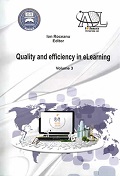E-LEARNING IN FOREIGN LANGUAGE TEACHING: WHAT IS GAINED AND WHAT IS LOST
E-LEARNING IN FOREIGN LANGUAGE TEACHING: WHAT IS GAINED AND WHAT IS LOST
Author(s): Irina David, Lucia-Mihaela GrosuSubject(s): Education
Published by: Carol I National Defence University Publishing House
Keywords: higher education; LSP; blended teaching
Summary/Abstract: This article will try to clarify two interesting dilemmas related to the up-to-date topic of elearning: Are traditional methods of teaching in danger of becoming old-fashioned? And are students’ needs better served by using Information and Communications Technology (ICT) tools? We will answer these questions, as we discuss the case of foreign language and business communication teaching at the Bucharest University of Economic Studies. Our research is based on a critical analysis of a twofold survey conducted both among undergraduate students and among foreign language teachers from this institution. We will bring into prominence the advantages and disadvantages of e-learning from both students’ and trainers’ perspectives, thus trying to offer a complex approach to e-learning in this specific field. Our initial assumption was that learners’ and trainers’ attitudes towards e-learning differ significantly. We expected that the first tend to emphasize the innovative character of e-learning, while the latter are more aware of its pitfalls compared to traditional teaching methods. However, our research findings have proved that these differences are not as many as expected. This study will show that in the field of foreign language and business communication teaching, the role of a blended approach (mixing traditional and innovative teaching methods) becomes a prerequisite for the education of the future.
Journal: Conference proceedings of »eLearning and Software for Education« (eLSE)
- Issue Year: 9/2013
- Issue No: 03
- Page Range: 298-303
- Page Count: 6
- Language: English

